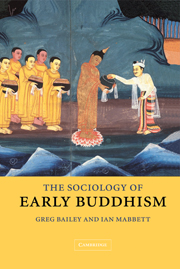Book contents
- Frontmatter
- Contents
- Acknowledgements
- List of abbreviations
- Introduction
- 1 The problem: asceticism and urban life
- CONTEXT
- 2 The social elite
- 3 Economic conditions
- 4 Urbanization, urbanism and the development of large-scale political structures
- 5 Brahmins and other competitors
- 6 Folk religion and cosmology: meeting of two thought worlds
- MEDIATION
- Conclusion
- Bibliography
- Index
3 - Economic conditions
Published online by Cambridge University Press: 22 September 2009
- Frontmatter
- Contents
- Acknowledgements
- List of abbreviations
- Introduction
- 1 The problem: asceticism and urban life
- CONTEXT
- 2 The social elite
- 3 Economic conditions
- 4 Urbanization, urbanism and the development of large-scale political structures
- 5 Brahmins and other competitors
- 6 Folk religion and cosmology: meeting of two thought worlds
- MEDIATION
- Conclusion
- Bibliography
- Index
Summary
An acceptance that Buddhism originally began as an elite movement requires us to extend our discussion into a study of the economic conditions associated with elite status, the relationship between these conditions and the development and survival of Buddhism. Weberian analysis has long shown the complex interplay between material development and ideological support or denial from religious groups. Buddhist doctrine appeared to provide active encouragement to the most striking of the newly emergent groups exploiting changed political and productive conditions, namely the merchants and farmers. The former group, while certainly not homogeneous, was not only developing into a major producer and disseminator of new kinds of goods, but was also very active in promoting its own status and its concerns as being central to those of society. The perception that Buddhism provided an ideological support to this group leads us to confront a number of questions rising in part from the previous chapter:
Why would an ascetic group disdainful of material wealth, and the motivations leading to its accumulation, give ideological support to such a group?
Why would this group in return provide material support to the fledgling Buddhist group?
What kind of economy was it that allowed this group to emerge and apparently become so successful?
To answer these requires us first to investigate the economic conditions of the time. It is difficult to envisage an ‘economy’ existing in the Buddha's time. The economy is at best an abstract term used to categorize and describe particular aspects of human interaction.
- Type
- Chapter
- Information
- The Sociology of Early Buddhism , pp. 56 - 76Publisher: Cambridge University PressPrint publication year: 2003

